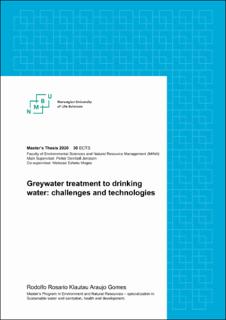| dc.contributor.advisor | Eshetu Moges, Melesse | |
| dc.contributor.advisor | Jenssen, Petter Deinboll | |
| dc.contributor.author | Rosario Klautau Araujo Gomes, Rodolfo | |
| dc.coverage.spatial | Norway | en_US |
| dc.date.accessioned | 2020-11-03T09:47:19Z | |
| dc.date.available | 2020-11-03T09:47:19Z | |
| dc.date.issued | 2020 | |
| dc.identifier.uri | https://hdl.handle.net/11250/2686153 | |
| dc.description.abstract | Water is a vital source to human health and well-being and an important engine in ecosystem services and a precondition for economic prosperity and sustainable development. However, water scarcity is becoming a rising concern around the world due to a blend of population growth, consumption patterns and socio-economic development. Wastewater reuse and reclamation offers interesting possibilities to overcome water scarcity. How to find solutions to achieve equilibrium between demand and supply intensify in the scenario of increasing pressures on water resources. The wastewater management systems and sustainable sanitation can soften demand from agriculture, freshwater supply, industry, energy generation and ecosystem replenishment by saving the insert of freshwater into the system and by providing the water fraction of wastewater available for environmental release and safe use. Decentralized source separation systems, that handle grey- and blackwater separately, are an attractive alternative due to the potential of water saving and resource recovery, where greywater reuse has the capacity to reduce the demand for new water. The main objective of this thesis is to investigate the challenges and prospects of using greywater as a source of drinking water and potential applications of decentralized greywater technologies to achieve drinking water quality. This thesis provides a literature review based on principles, facts and discussions regarding greywater characteristics and its challenges for reuse as well as an overview of potential technologies for decentralized greywater treatment. The study revealed that greywater represents one interesting alternative source of potable water due to the lower contamination than mixed wastewater. Furthermore, greywater can present challenges regarding organic micro-pollutants, pathogens, public perception when using greywater as a source of producing drinking water. There is a wide variation in greywater characteristics and volume generation rates which it is dependent on the, lifestyle patterns and type of settlement. The available technologies have been developed to treat or remove specific pollutants, but they do not offer alone full treatment of the greywater to drinking water. Filtration systems have the potential of integration with other systems to achieve potable water quality. Membrane processes are compact technologies for upgrading greywater pretreated from mechanical / biological / chemical process to drinking water. Public perception of greywater reuse is important to consider for implementation of adequate methods for a specific context. | en_US |
| dc.language.iso | eng | en_US |
| dc.publisher | Norwegian University of Life Sciences, Ås | en_US |
| dc.rights | Attribution-NonCommercial-NoDerivatives 4.0 Internasjonal | * |
| dc.rights.uri | http://creativecommons.org/licenses/by-nc-nd/4.0/deed.no | * |
| dc.subject | Greywater | en_US |
| dc.subject | reuse | en_US |
| dc.subject | drinking water | en_US |
| dc.subject | challenges | en_US |
| dc.subject | technologies | en_US |
| dc.subject | treatment | en_US |
| dc.subject | organic micro-pollutants | en_US |
| dc.subject | pathogens | en_US |
| dc.subject | public perception | en_US |
| dc.title | Greywater treatment to drinking water : challenges and technologies | en_US |
| dc.type | Master thesis | en_US |
| dc.description.version | submittedVersion | en_US |
| dc.subject.nsi | VDP::Technology: 500::Environmental engineering: 610 | en_US |
| dc.description.localcode | M-MINA | en_US |

